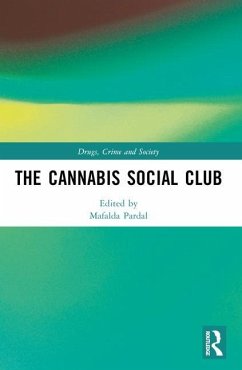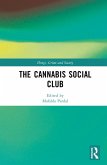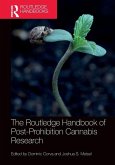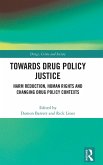As cannabis legalization reforms are underway, there is some concern that non-profit, 'middle ground' options may remain under-researched and thus less visible. This book offers an in-depth account of one of the possible 'middle ground' models for the supply of cannabis: the Cannabis Social Club.
Cannabis Social Clubs (CSCs) are typically formal, non-profit associations of adult cannabis users who produce and distribute that substance close to or at cost price among themselves. They constitute an user-driven model for the supply of cannabis. In most jurisdictions, CSCs remain a grass roots, unregulated initiative of groups of users, but the model has been legalized in Uruguay and Malta, and it has featured recent debates and legislative proposals in other countries. This book brings together contributions from internationally respected scholars, drawing on case studies, empirical findings and policy reflections, from a range of countries (such as Belgium, Canada, New Zealand, Spain, Uruguay, USA), and a consideration of the CSC model from different disciplinary backgrounds. Part one provides detailed analysis of where and how CSCs have been operating, and a critical analysis of their key features and relationship with institutional actors. Part two discusses several policy outcomes and proposes a design of a regulatory market, as well as considering whether the CSC model might be suited for adaptation to the supply of other substances.
The Cannabis Social Club is important reading for academics in the fields of drug policy analysis, criminology, economics, policy studies and anthropology. It will also be of interest to policy makers, journalists, law-enforcement personnel.
Cannabis Social Clubs (CSCs) are typically formal, non-profit associations of adult cannabis users who produce and distribute that substance close to or at cost price among themselves. They constitute an user-driven model for the supply of cannabis. In most jurisdictions, CSCs remain a grass roots, unregulated initiative of groups of users, but the model has been legalized in Uruguay and Malta, and it has featured recent debates and legislative proposals in other countries. This book brings together contributions from internationally respected scholars, drawing on case studies, empirical findings and policy reflections, from a range of countries (such as Belgium, Canada, New Zealand, Spain, Uruguay, USA), and a consideration of the CSC model from different disciplinary backgrounds. Part one provides detailed analysis of where and how CSCs have been operating, and a critical analysis of their key features and relationship with institutional actors. Part two discusses several policy outcomes and proposes a design of a regulatory market, as well as considering whether the CSC model might be suited for adaptation to the supply of other substances.
The Cannabis Social Club is important reading for academics in the fields of drug policy analysis, criminology, economics, policy studies and anthropology. It will also be of interest to policy makers, journalists, law-enforcement personnel.
"The failure of the current prohibitionist cannabis policy has led to an international debate in search of other regulatory models for cannabis. A first departure from the prohibitionist model in many countries has been the decriminalization of the consumption and possession of cannabis for personal use, which de facto allowed the emergence of Cannabis Social Clubs as a risk reduction initiative within that prohibitionist framework. This model of self-organization of consumption has been reproduced informally in many countries and has become an alternative system of production and legal supply.
This book analyses the international repercussions of the Cannabis Social Club model and highlights the advantages and limitations of this route of access to cannabis. It is a must read for those looking for new alternative regulatory models for cannabis."
Juan Muñoz Sánchez, Professor of Criminal Law, University of Malaga, Spain
"The emergence of the Cannabis Social Club model in legal, quasi-legal and wholly illegal incarnations in different countries around the world poses both a threat and an opportunity to existing drug policy regimes. This timely and important collection collated by Mafalda Pardal provides interdisciplinary and international insights into this novel model of drug supply and will be of interest to those working in fields as diverse as drug policy, social movements, criminology and cultural studies. An excellent contribution to the literature."
Gary Potter, Reader in Criminology & Research Director, Lancaster University, UK
"Cannabis policy is changing throughout the Western world. While full legalization in North America captures the headlines, more relevant for European debate are the Cannabis Social Clubs that have emerged in the last 20 years. This collection of essays on how the clubs have grown and interacted throughout the world, from Uruguay and New Zealand to Spain and Belgium, provides many insights into an important innovation in drug policy."
Peter Reuter, Distinguished University Professor, School of Public Policy and Department of Criminology, University of Maryland, USA
"Current prohibitionist drug policies have shown to be ineffective to reduce harms related to drug consumption and trafficking. Although many national governments are not ready to change the paradigm regarding drug policies, Cannabis Social Clubs emerge to be an alternative to implement harm reduction policies in prohibitionist contexts. The experiences of these Clubs in Europe, New Zealand and Uruguay give us hope to think about a regulatory drug policy based on human rights and individual liberties for cannabis consumption. This book gives us evidence on how the Cannabis Social Clubs worked in different contexts, what the barriers for their implementation are and how they have provided a setting to create transnational collaborative spaces towards a drug policy reform. Combining this evidence with the effects of emerging cannabis regulatory frameworks implemented in Canada and at the state level in the United States gives us a complete scenario on how we can move away from prohibition and start thinking on international and comprehensive policy reforms."
Laura Atuesta, Full Professor - Researcher, Center for Research and Teaching in Economics (CIDE), Mexico
"One of the places where the value of a broader vision is potentially most evident is in relation to the Cannabis Social Club (CSC) model. This is the subject of this excellent collection of essays edited by leading CSC expert Mafalda Pardal. The book begins with a masterly overview by Pardal, which not only provides a superb introduction to the book but also serves as a perfect primer for anyone unfamiliar with the CSC concept. The first part of the book consists of five chapters which take us on a guided tour of CSCs in Spain, Belgium and elsewhere in Europe, as well as Uruguay and New Zealand. One of the points that this book beautifully illustrates is that making sense of CSCs is a more complex intellectual challenge than it might first appear."
- Toby Seddon, Drugs, Habits and Social Policy, Vol 24 Issue 2, pp. 143-144. https://doi.org/10.1108/DHS-06-2023-067
"Cannabis policy is changing around the globe, with an increasing number of countries experimenting with different systems of decriminalization and regulation. This edited collection explores one facet of that phenomenon-the often-overlooked not-for-profit cannabis social club (CSC). The Editor's introduction charts a 30-year history of the development of CSCs encompassing their Spanish inception, spread throughout Europe and further afield, and transformation in some cases to a more commercial undertaking. As a whole, The Cannabis Social Club presents an approach to this issue which combines comparative, transnational and global elements."
- Caroline Chatwin, Addiction SSA, DOI: 10.1111/add.16392
"The structure called Social Cannabis Club presents legal, semi-legal and illegal versions on several continents around the world. From a regulatory conception, it is both a threat and an opportunity for the current International Drug Control Regime. This compilation work by Mafalda Pardal is an interdisciplinary analysis, with a global aim, on this disruptive proposal-and collective action-for cannabis supply. Their findings and interpretations contribute to research, academic and institutional fields around drug policies, social movements, penal policies, trade reforms and disputes over the rights of drug users. [...] This book is a must-read for decision makers, public officials, judges, prosecutors, sociologists, anthropologists, political scientists, doctors and legal professionals. Also for journalists, digital content managers and security forces officials."
- Andrés Rodríguez Mera, doi.org/10.29166/csociales.v1i45.5414
This book analyses the international repercussions of the Cannabis Social Club model and highlights the advantages and limitations of this route of access to cannabis. It is a must read for those looking for new alternative regulatory models for cannabis."
Juan Muñoz Sánchez, Professor of Criminal Law, University of Malaga, Spain
"The emergence of the Cannabis Social Club model in legal, quasi-legal and wholly illegal incarnations in different countries around the world poses both a threat and an opportunity to existing drug policy regimes. This timely and important collection collated by Mafalda Pardal provides interdisciplinary and international insights into this novel model of drug supply and will be of interest to those working in fields as diverse as drug policy, social movements, criminology and cultural studies. An excellent contribution to the literature."
Gary Potter, Reader in Criminology & Research Director, Lancaster University, UK
"Cannabis policy is changing throughout the Western world. While full legalization in North America captures the headlines, more relevant for European debate are the Cannabis Social Clubs that have emerged in the last 20 years. This collection of essays on how the clubs have grown and interacted throughout the world, from Uruguay and New Zealand to Spain and Belgium, provides many insights into an important innovation in drug policy."
Peter Reuter, Distinguished University Professor, School of Public Policy and Department of Criminology, University of Maryland, USA
"Current prohibitionist drug policies have shown to be ineffective to reduce harms related to drug consumption and trafficking. Although many national governments are not ready to change the paradigm regarding drug policies, Cannabis Social Clubs emerge to be an alternative to implement harm reduction policies in prohibitionist contexts. The experiences of these Clubs in Europe, New Zealand and Uruguay give us hope to think about a regulatory drug policy based on human rights and individual liberties for cannabis consumption. This book gives us evidence on how the Cannabis Social Clubs worked in different contexts, what the barriers for their implementation are and how they have provided a setting to create transnational collaborative spaces towards a drug policy reform. Combining this evidence with the effects of emerging cannabis regulatory frameworks implemented in Canada and at the state level in the United States gives us a complete scenario on how we can move away from prohibition and start thinking on international and comprehensive policy reforms."
Laura Atuesta, Full Professor - Researcher, Center for Research and Teaching in Economics (CIDE), Mexico
"One of the places where the value of a broader vision is potentially most evident is in relation to the Cannabis Social Club (CSC) model. This is the subject of this excellent collection of essays edited by leading CSC expert Mafalda Pardal. The book begins with a masterly overview by Pardal, which not only provides a superb introduction to the book but also serves as a perfect primer for anyone unfamiliar with the CSC concept. The first part of the book consists of five chapters which take us on a guided tour of CSCs in Spain, Belgium and elsewhere in Europe, as well as Uruguay and New Zealand. One of the points that this book beautifully illustrates is that making sense of CSCs is a more complex intellectual challenge than it might first appear."
- Toby Seddon, Drugs, Habits and Social Policy, Vol 24 Issue 2, pp. 143-144. https://doi.org/10.1108/DHS-06-2023-067
"Cannabis policy is changing around the globe, with an increasing number of countries experimenting with different systems of decriminalization and regulation. This edited collection explores one facet of that phenomenon-the often-overlooked not-for-profit cannabis social club (CSC). The Editor's introduction charts a 30-year history of the development of CSCs encompassing their Spanish inception, spread throughout Europe and further afield, and transformation in some cases to a more commercial undertaking. As a whole, The Cannabis Social Club presents an approach to this issue which combines comparative, transnational and global elements."
- Caroline Chatwin, Addiction SSA, DOI: 10.1111/add.16392
"The structure called Social Cannabis Club presents legal, semi-legal and illegal versions on several continents around the world. From a regulatory conception, it is both a threat and an opportunity for the current International Drug Control Regime. This compilation work by Mafalda Pardal is an interdisciplinary analysis, with a global aim, on this disruptive proposal-and collective action-for cannabis supply. Their findings and interpretations contribute to research, academic and institutional fields around drug policies, social movements, penal policies, trade reforms and disputes over the rights of drug users. [...] This book is a must-read for decision makers, public officials, judges, prosecutors, sociologists, anthropologists, political scientists, doctors and legal professionals. Also for journalists, digital content managers and security forces officials."
- Andrés Rodríguez Mera, doi.org/10.29166/csociales.v1i45.5414








